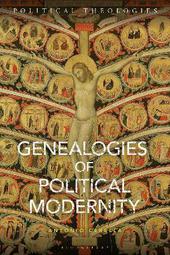
|
Genealogies of Political Modernity
Hardback
Main Details
Description
What is political modernity? And how much of its concepts and structures has changed or remained the same with the advent of the so-called globalization? What does it mean, from a political perspective, that we live in a postmodern era? This book discusses these issues in light of the key authors and texts of the continental philosophical tradition: from Carl Schmitt to Giorgio Agamben, from Thomas Hobbes to Michel Foucault. Looking at the roots of the current historical crisis that characterizes Western political regimes, this book gazes into the past in order to trace the possible development of our current global era, in which all the classical concepts and our symbolic resources seem to be called into question, leaving a vacuum of meaning for political action as much as for political theory.
Author Biography
Antonio Cerella is Senior Lecturer in Political Theory and International Studies at Kingston University London, UK.
ReviewsGenealogies of Political Modernity is an excellent book, examining an important aspect of political modernity, its immanentisation and secularisation of theological ways of thinking. The book offers an important and necessary genealogy of political modernity, particularly in the light of our current political crises. * Charlie Gere, Professor of Media Theory and History, Lancaster University United Kingdom * Despite a key supposition of modernity that it has broken with tradition and started history from a clean slate, its political, social, economic, and other realities are firmly anchored in the past it despises. Antonio Cerella has done a marvellous job of exposing modernity's largely disavowed spatiotemporal roots along with a plethora of contingencies that surprise the thrust of their predetermined movement. The result is a book that is a 'must-read' for anyone interested in the history of the present. * Michael Marder, Research Professor of Philosophy, University of the Basque Country, Spain *
|